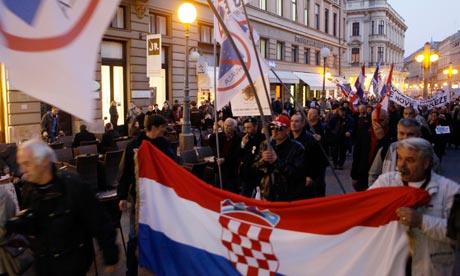Canada: Thomas Mulcair, the New Democratic Party and the social movements

"Thomas Mulcair is a man of the establishment, not of the social movements."
[Read more on Canada's New Democratic Party HERE.]
By Paul Kellogg
March 27, 2012 -- PolEcon.net, posted at Links International Journal of Socialist Renewal with the author's permission -- Canada's social-democratic New Democratic Party (NDP) has a new federal leader. Thomas Mulcair, has no roots in the social movements, a long history of being a senior Liberal Party member and is someone openly committed to pushing the NDP considerably to the right. The implications for all interested in progressive social change are sobering.
Photo essay: Guatemala -- Indigenous, peasant and popular march arrives in Guatemala City
Text and photos by James Rodriguez, Guatemala City, Guatemala
March 27, 2012 -- Mimundo.org, posted at Links International Journal of Socialist Renewal with permission -- After nine days and 212 kilometres, the Indigenous, Campesino and Popular March for the Defence of Mother Earth, against evictions, criminalisation and in favour of integrated rural development, arrived to the centre of the capital city. According to members of the Committee for Campesino Unity (CUC), it is estimated that about 15,000 people participated in the ninth and final day of the march.
Spain: Huge general strike could mark turning of tide
By Dick Nichols, Barcelona
April 1, 2012 -- Green Left Weekly/Links International Journal of Socialist Renewal -- Since the global economic crisis broke out in 2008, the many-sided protest movement against neoliberal austerity has yet to gain enough strength to force any real retreats from governments doing the bidding of capitalism’s ruling elites.
But the March 29 general strike against the new labour law in Spain — hugely supported and backed by often vast demonstrations in 111 cities and towns — could well point to a turning of the tide.
It lifted social resistance in Europe to a new height and gave millions of people a glimpse of how they might finally make the country’s corrupt and arrogant powers-that-be pay for their crisis.
The right-wing media screamed “flop”, but the behaviour of the finance markets told the real story: on strike day the Madrid stock exchange lost nearly 1% (its eighth straight day of losses) and the premium on Spanish public debt rose further over the Italian debt premium that only recently exceeded it.
Malalai Joya: Foreign troops must leave Afghanistan

March 25, 2012 -- Green Left Weekly/Links International Journal of Socialist Renewal -- Malalai Joya, a former MP and one of Afghanistan’s best-known democratic leaders, recently survived the sixth attempt on her life. Taliban gunmen attacked her office at 3 am on March 10, wounding two of her guards. In an exclusive interview, she told Green Left Weekly/Links International Journal of Socialist Renewal’s Pip Hinman that “such terrorist acts will never stop my fight for freedom, democracy and justice”.
Joya will visit Australia in April to speak at the Marxism 2012 conference in Melbourne and a Stop the War Coalition public meeting in Sydney on April 11.
* * *

Protesters rally during anti-government protest in Zagreb, Croatia, March 2011. Photograph: Darko Bandic/AP.
[Links International Journal of Socialist Renewal urges its readers to consider taking out a subscription to Monthly Review, where this article first appeared.]
By Srećko Horvat and Igor Štiks
Mulcair’s victory: A new direction for Canada's NDP?

NDP leader Thomas Mulcair.
Denmark: Anti-racist protest outnumbers 'all-Europe' racist/fascist gathering
By Ron Ridenour, Copenhagen
Doug Lorimer's introduction to 'Imperialism: The Highest Stage of Capitalism'
Introduction by Doug Lorimer
Bo Xilai.
Sudan: Mohamed Ibrahim Nugud's ideas will live on
By Abohoraira Ali
Debate: Neoliberalism in disguise in Bolivia?

Location of the indigenous territory and national park known as TIPNIS.
